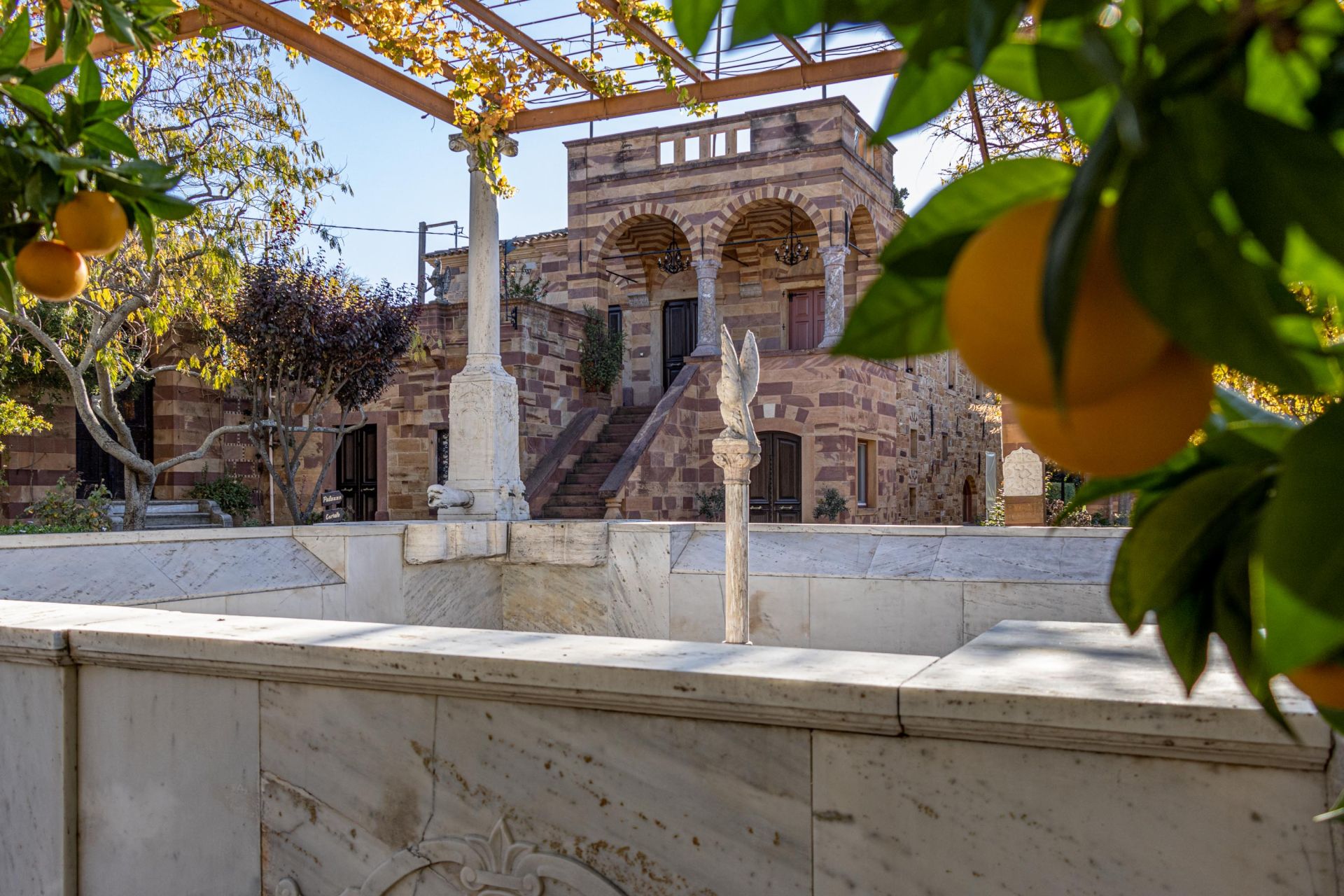Early in my field work on Greece’s northeastern Aegean island of Chios, I visited the municipal tourism office to collect every map, book and pamphlet I could lay my hands on. Among these was a brochure promoting Chios as a wedding destination. It featured young couples in navy blue suits and white lace gowns posing at the island’s most scenic spots: among rare, weeping mastic trees in the south and at the northern chapel of Agios Isidoros, which sits on a rocky outcropping surrounded by sea. Much of the brochure focused on an area called Kampos, a fertile plain of historic, walled estates and citrus groves six miles south of Chios town.
In Kampos, monumental gateways of maroon and spice-colored stone framed bride and groom, while spacious courtyards with black-and-white pebble mosaics hosted long banquet tables dressed with green, leafy runners of ripe Chios mandarins, known for their intense aroma and flavor. The two-story mansions with their grand staircases, columns and balconies created an atmosphere of rustic, old-world opulence. I loved seeing the spaces so festive and full.
I imagine this scene must not be so different from a wedding reception during Kampos’ heyday in the 17th and 18th centuries, when powerful merchant families with trading networks across the known world converted these Genoese tower-houses into luxurious summer residences. Back then, each estate was a self-sufficient ecosystem whose residence and farmland functioned in harmony. Income from citrus fruits — then luxury goods introduced to Chios by the Genoese — covered production costs, workers’ wages and expenses for the upkeep of the estate. Odysseas Xydas, the owner of the Perivoli estate, told me the fruit was so valuable “a Russian worker would spend a whole day’s wage to buy one orange to give as a Christmas present to his child.”
Kampos has fallen a great deal since then, its golden age extinguished by two catastrophes. In 1822, during the Greek Revolution, Ottoman Turks decimated the island’s population, killing or enslaving many of the merchant families. A few decades later, as Kampos was beginning to recover, an earthquake in 1881 leveled the neighborhood. Today, much of it lies in ruins, shuttered and abandoned. Of 225 historic estates, fewer than 40 remain, most of which are listed monuments. The island’s history is engraved in the stately façades and reused architectural elements of this paradise lost, though the public rarely gets to see them.
Before I ever tasted a Chios mandarin, set foot inside a pebble courtyard or learned what calamities befell the rich merchant families who built their summer homes here, the walls of their estates piqued my curiosity. Every time I approached town from the mastic villages, Thymianan limestone rose up on either side of me. The road narrowed and twisted around the sharp corners of tower-like buildings with only a few well-placed mirrors to prevent collisions with oncoming cars. There were no places to stop or yield, not even a sidewalk, increasing my claustrophobia.
Sometimes I glimpsed the top of a mansion or saw a pomegranate tree dangling its red fruit over a wall. In some places, portions of earth-colored stone had crumbled away, revealing dense citrus orchards. It reminded me of my grandparents’ neighborhood in Manila, which has the same air of faded grandeur. We spent Christmas breaks with them when I was a child, and I remember arriving from the airport late at night and waiting in the darkened car for the driver to open the large metal gate to my grandparents’ compound. Over the gate, a red, star-shaped lantern shone from my aunt’s window, hinting at the treasures within.
Who lives in these estates now? I wondered. What unseen worlds do they contain? As a writer curious about borders who is always searching for access to people’s lives and stories, the tall walls that afford residents privacy and protect their citrus trees from the wind stimulated my imagination. I left the busy streets and relentless traffic behind and spent afternoons wandering down Kampos’ quiet, shaded lanes, appreciating the smell of citrus and jasmine in the air, hoping an open gate might offer me a glimpse into a walled garden. “Kampos is a fairy-tale place,” tour guide Thomas Karamouslis told me. “Its residents were always a little eccentric, each locked in their own orchard.”
Being bookish myself and often turned inwards, I felt an immediate kinship with the residents of Kampos and with the estates themselves. Sometimes my reserve unsettles my Greek partner Andreas, who once described me as a library full of knowledge and stories that’s closed to the public — one of the most accurate descriptions of myself I’ve ever heard. He often laments my inability to have “serious” conversations, having to read my journal entries to find out weeks later how I feel about things and checking in with me at parties when he thinks I’ve been too quiet. I’ve given him the key, but there are still volumes within me he feels he can’t read.
We met three years ago while I was working as the speechwriter for the U.S. Embassy and he was back in Athens for the holidays. From that first date, when we both ordered tea instead of coffee, when we spoke about our travels and experiences as immigrants in a flurry of Greek and English and kissed on a secluded park bench at the foot of Lykavittos Hill, the highest point in Athens, there was a sense of inevitability to our romance, as though this gently attentive and excitable boy, this big-hearted polyglot with large, doleful eyes, was the one I’d been waiting my whole life to meet. After our date, he read all the writing on my website, and said that was when he started falling for me. Though he lived and worked in Switzerland, he flew back to Greece ten days later so we could spend Christmas together. We braved lockdowns, quarantines and testing requirements to find each other throughout the Covid pandemic. For the first time, I was with someone who loved me back, who showed me every day how deeply he cared for me, and the solidity of our bond offered me a security I’d never before known.
In 2021, I received an immersive two-year writing fellowship from the Institute of Current World Affairs, funded by the Stavros Niarchos Foundation, a world-renowned philanthropic organization that focuses on arts and culture. For me, it was a life-changing opportunity to dive into the history and culture of Greece’s frontiers, to pursue subjects I’d written about at the embassy and to continue my deep exploration of the country I’d fallen in love with as a Fulbrighter in 2016. But it was a very difficult decision for us as a couple, prolonging the pain of being apart and delaying the moment when we could finally live together.
I chose Chios as a base not only because its position between western Europe and Asia Minor made it an important trading hub and brought thousands of refugees to its shores, but also for more personal reasons. Andreas’ mother is from the island, and he spent every summer there until he left Greece for his master’s program. For years, he and his brother dove for shells and explored sea caves and shipwrecks in beaches like rocky Vroulidia, sandy Komi and the famous black pebble beach, Mavra Volia. He shared many of these experiences with me when he visited Chios last August. Together, we swam from the secluded southwestern beach of Kalos Limenas to the islet of Agios Stefanos and enjoyed some of his favorite childhood treats, like the mastic-flavored “submarine” sweet and oven-baked spaghetti from Pizza Lykos. Smell is an important sense for him, linked to his memories of the island’s many aromas: the distinct, piney scent of mastic trees, jasmine, rose, oregano, thyme and the sweet citrus orchards within Kampos’ walled villas. Living on Chios and spending the summer with Andreas’ parents helped me understand him better and eased the time apart. We got engaged earlier this year, and though we weren’t planning to get married on Chios, I kept the brochure, often flipping through it as our plans matured.
I got to know the residents of Kampos slowly, as one introduced me to another and I learned the names that unlocked the monumental gates. I ran into familiar faces on my long walks, and they opened churches for me and welcomed me into their homes with spoon sweet preserves made from their orchards, a staple of Kampousiki hospitality. We sat on their balconies overlooking the citrus groves while I enjoyed an aromatic coil of bitter orange peel or pink rose petals glazed in syrup on a tiny, ornate crystal dish. From September to December 2022, as the mandarins ripened and began to fall, I found myself returning to Kampos again and again, even after I had collected enough material to write my monthly dispatch. When Andreas asked what I was up to, I sent him photos of the latest estate I was visiting, its water wheel, cistern, living space and orchards arranged in hundreds of appealing combinations. “Each has its beauty and its personality,” said Odysseas’ father Vangelis Xydas, a soft-spoken man with worn hands who has dedicated his life to Kampos. Vangelis operates the Perleas estate, a guesthouse specializing in agritourism activities. “They’re like people. We all have eyes, noses and ears, but each person has their own face,” he added.
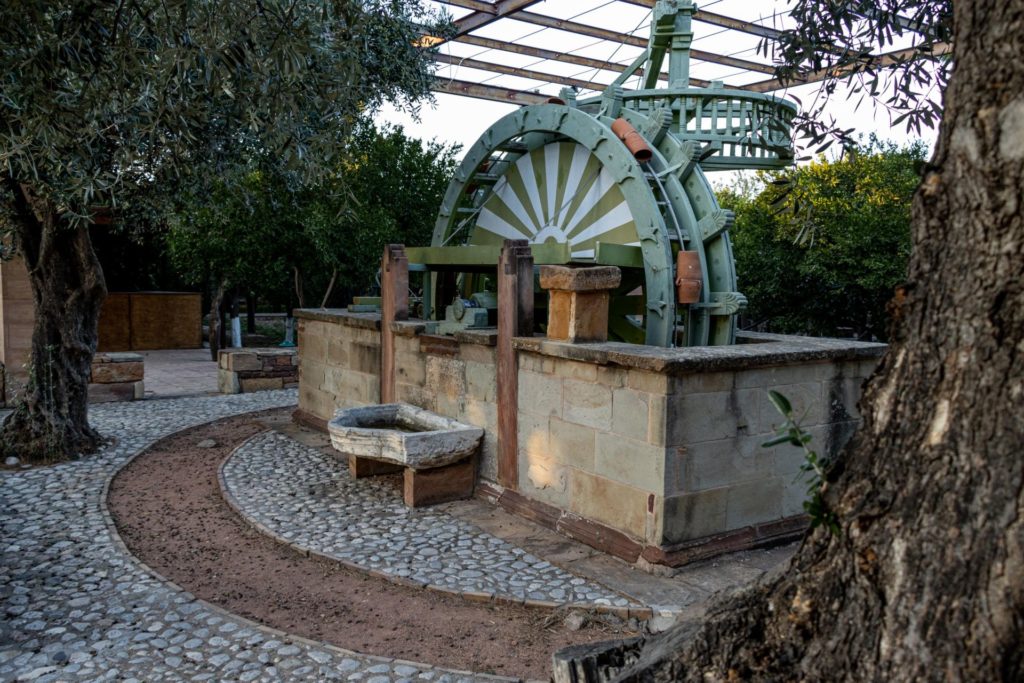
Water was always in high demand on the island, and irrigation needs informed the estates’ design. The well and its wooden water wheel, called a mánganos, forms the heart of each estate as it supplies water to the orchards and fields. Water drawn from the well fills a nearby rectangular cistern or stérna, where it is stored until needed. A pergola usually covers the mánganos and stérna to prevent evaporation, creating a cool microclimate within the estate.
The mánganos is traditionally powered by a donkey walking along a circular track, though today most owners use mechanical pumps and water their orchards with a network of tubes that hang from the branches like black web. These modern techniques, though arguably more efficient, have altered the delicate balance so integral to the tranquility and long-term sustainability of each estate. For instance, over-extraction of groundwater and the turn to more lucrative but water-intensive crops like potatoes has depleted the water table and increased its salinity. Giorgis Mastorakis, a 72-year-old resident of Kampos, recalls that working on an estate as a teenager was “an opportunity to live with nature. The sound of the mánganos drawing water, the symphony of frogs in the stérna at night, the birds, the lack of airplane noise. All that has been lost.”
The traditional methods, remnants of an older time, have an enduring charm. While touring the Antouaniko estate with the architect Manolis Vournous, I couldn’t believe my eyes. Terracotta buckets brought up water from the well, and it gushed from marble spouts into the stérna, then ran down sandstone channels to the orchards. In the courtyard, tall trees shaded intricate star and floral designs composed of black and white pebbles, and through the garden gate, the white, painted trunks of the mandarin trees stood in ordered rows like soldiers. Manolis and his partner Katerina Manoliadi, who restored the Antouaniko, kept the patinas and traces of the past. Viewing the estate as dynamic and organic, they tried to maintain elements rather than replace them and sought to accommodate the natural environment.
I spent hours photographing the estate, exploring its every nook and cranny. Since high school, when I recorded class projects on my dad’s camcorder and spliced footage together on the VCR, visual and written storytelling have been intertwined. During and after college, I traveled around the world, creating short films and documentaries. I used the camera to illustrate stories, focusing my attention to capture moments and gestures others might miss. I believed that understanding lay in details, and if I looked long enough, penetratingly enough, I could attain intimate knowledge of my subjects. In graduate school, I took an advanced photography class alongside my creative writing coursework, learning composition, color and, above all, patience. Professors commented on the cinematic quality of my writing. Then, for years, the camera was my sole companion as I explored Greece’s mountain-top villages, monasteries and mythological sites, a witness to the awe that constantly surrounded me and a way of sharing my experiences with friends and loved ones back home. I came to see the photos I took as a record of myself, an imprint of consciousness.
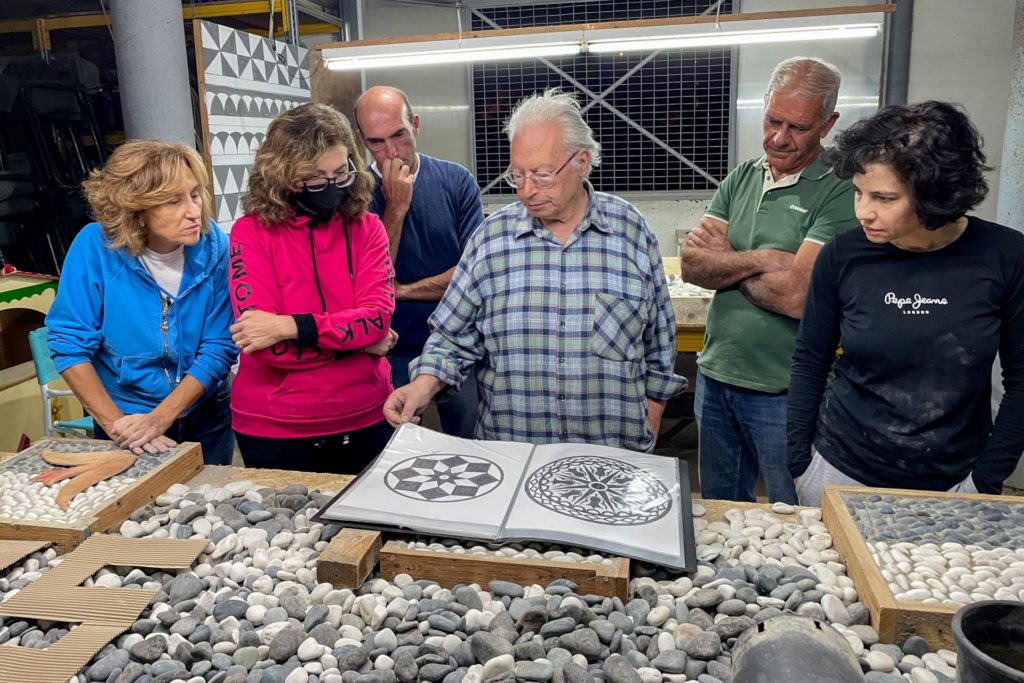
As I stood on the Antouaniko’s second floor balcony admiring the view over the orchards, I thought about the international orientation shared by so many residents who built their estates with money made in London, Egypt, India or Constantinople. They customarily planted trees on their estates to mark new births, so, in Kampos’ gardens, you can find palm trees and Black Sea pines brought home from travels abroad. That affluence nurtured a class of forward-thinking Chian intellectuals and artists with strong ties to the West who would play leading roles on the island and in the formation of the Greek state. I met several residents with ties to Switzerland; some split their time between there and Chios. Perhaps this cosmopolitanism is part of what makes Kampos feel like home. After all, a familiarity with different cultures and the experience of being a foreigner is an important ingredient in my relationship with Andreas.
According to Manolis, the pattern of foreign funding from earlier periods of Kampos’ history continues today, as shipowners and wealthy Greek Americans restore long-neglected mansions. Both Antouaniko, which won the 2015 European Heritage Award / Europa Nostra Award, Europe’s most prestigious conservation prize, and Perleas, which reputedly has the best-preserved and most prosperous orchards, belong to the Prokopiou family, billionaire Greek shipowners with ties to Chios. In its heyday, citrus production covered an estate’s costs, but after prices plunged in the 1960s, many permanent residents could not afford to repair walls and structures damaged by frequent seismic activity. Vangelis estimates that renovating an estate today can easily cost one or two million euros. (One euro currently equates to about $1.06.) They require constant upkeep, and the most impressive estates I visited employ year-round staff to maintain the property and cultivate the orchards and fields.
Citrus trees produce tons of fruit in a short time. Due to low market prices, it often isn’t worth it to pay workers to collect the fruit, so much of it falls to the ground and decomposes or gets eaten by rats. The Argentiko estate donates fruit from its 2,800 trees to the army and nursing homes. Antonis Evodias, who cultivates the orchards at the Karaviko estate, sells fruit to supermarkets in Chios and Athens and has a stand at the Saturday farmer’s market in Chios Town. He also sells to Chios Gardens, a large, Kampos-based juice brand. He told me he receives about 50 cents per kilo for Chios mandarins and 18 cents per kilo for mandarins used for juice. Competition with producers from Brazil, Mexico and the United States has driven the price down, and there’s lower demand for Chios mandarins and oranges since they have seeds and are less sweet. This year, production costs have risen drastically, draining away profits. “Fertilizer, seeds, electricity, oil — they’ve all gone up,” he said. “If I work day and night only to earn the same wage as my workers, what’s the point?”
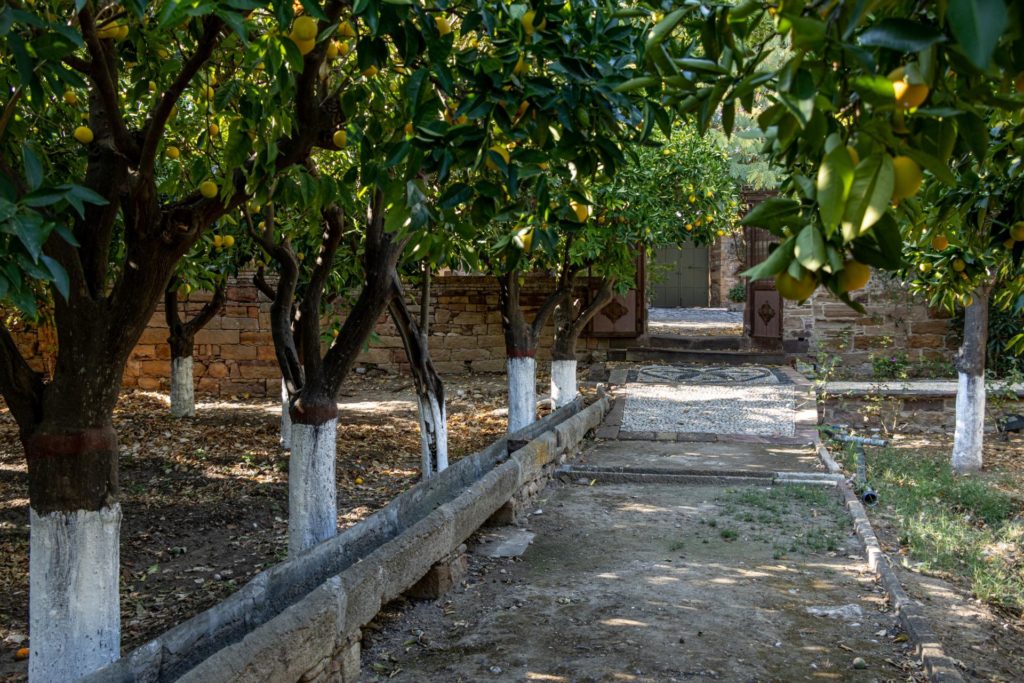
Meanwhile, Kampos’ spoon sweet tradition has developed into a small industry, enabling producers to add value to the fruit and preserve part of the harvest by boiling it in sugar syrup. Many of these companies are family businesses with factories in or near Kampos that source their fruit and raw materials locally. In an estate that formerly belonged to the noble Schilizzi family, Stefanos Palios and his wife Katerina have run Aunt Evangelia’s Sweets since 2006, using family recipes with no preservatives, just lemon and sugar. Stefanos started the business with his mother, and she posed as Aunt Evangelia — her grandmother — for the company logo.
Perleas’ citrus grove is certified for organic farming and, in addition to running the estate as a guesthouse for over 30 years, Vangelis has made many attempts to wring profit from the fruit. “The old model of exporting fruit and making juice, that’s finished,” he told me. “You need something new, something smart.” As well as making spoon sweets and mandarin juice that Odysseas sells at Perivoli, Vangelis has produced essential oils and a mandarin puree for renowned Greek confectioner Stelios Parliaros. Chios Gardens featured him in a commercial as one of their producers. Still, he insists fruit alone won’t save Kampos. “We talk and we talk about citrus fruit, but you can’t live from them, even if you sell them at one euro per kilo,” he said. “All that you see here wasn’t made by money from mandarins. It was made by huge businesses abroad.” While he’s optimistic Kampos will eventually find its way, it will take hard work, investment and risk.
For the region to survive, residents will have to develop new revenue streams for their estates and work together on a holistic plan for the neighborhood, while lobbying to close permitting loopholes, reduce through traffic and regulate water use. Vangelis envisions Kampos as a future cultural center with galleries, a library, an artisanal bakery and estate-based shops selling handcrafted furniture and organic local products. He wants to open Kampos to the community, acknowledging that the estates can’t survive with neither private backing nor public support. It remains to be seen whether this dream can become a reality. “There’s not one single estate in Kampos that makes money,” Manolis told me. “You must invest a lot of time, a lot of capital, in order to make even a little bit of money back, growing slowly like Perivoli or Perleas. But you can’t grow beyond a family business, and it depends on your ability, skills and personality and the genius loci of the property.”
To date, Perivoli is the only estate open to the public every day, a model for what Kampos could become. It hosts the Citrus Museum, a starting point for anyone interested in the neighborhood, and a friendly, sophisticated cafe that has become a treasured local haunt. Throughout the year and especially during the summer, Perivoli hosts parties, film screenings, concerts, readings, photography exhibits and weekly aperitif nights. This year, Odysseas organized a Halloween party with food from Mavro Provato, a cafe in northern Chios. The last time I visited, he had spent a week transforming the estate into a festively lit winter wonderland.
He plans to expand and modernize the museum and open a secondary building with a library and rooms for artistic events. He also wants to bring Vangelis’ spoon sweet factory to Perivoli so visitors can see the sweets being made, sample them and shop all in the same place. He plans to present an investment proposal to several shipowners to raise the necessary funds, which he estimates at 500,000 euros. “When I took over, I tried to make a space for locals too, not just for tourists,” he said. “My goal is to offer something for everyone.”
At the end of September, 20 days since Andreas left Chios and a week before we’d see each other again, islanders flocked to the Zygomaladiko estate for #ekipouzo, or “Where I Live,” a three-day art festival featuring over 50 local artists, writers, musicians, photographers, filmmakers and performers who had spent several months creating work at the mansion. The enthusiastic public reception reminded me of something Vangelis had told me: “When we created the museum at Perivoli, I realized what a great need people have to go inside an estate and see it.” Like me, they were eager to venture inside the walls, to share in the hidden, interior worlds so close to home.
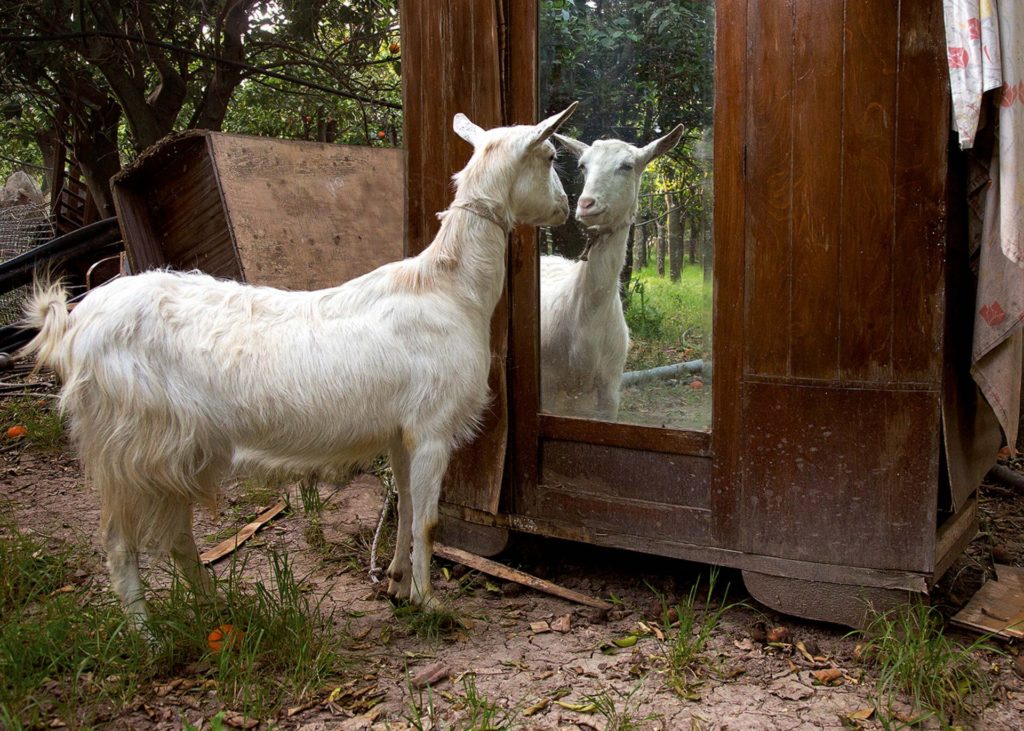
It makes sense that the mansion, with its domed entryway, elaborate pebble mosaics and marble staircase, would serve as a muse. It’s a masterpiece, as storied and carefully crafted as the art it inspired. I understood then why so many Kampos residents, past and present, painted, wrote or worked with their hands. The neighborhood’s timeless beauty nurtured one’s creativity. Whenever a local opened their gate to me, an entire world and life were revealed. Some were manicured Ligurian gardens, others wild havens for beloved animals. Each had a human face that hungered to be seen, acknowledged and understood. That’s why I kept coming back to linger in gardens and orchards, talk with residents and snap photos. Kampos’ power to attract attention and provoke a generative response gave me hope for its future.
The crowds that packed into the Zygomaladiko brought a vibrant new energy that had been missing from the estates I explored alone. For a night, we were Kampos insiders, gathering in the courtyard to watch a theatrical performance, then wandering the grounds to admire the unique architectural details and site-specific art. I took hundreds of photos that night and couldn’t wait to share them with Andreas.
What he wanted from me, I realized, was no different from what we wanted from Kampos: to be let in. He wanted to learn from me, to understand how I experience the world so he could anticipate my needs, care for me better. At the same time, he was becoming my muse, reorienting my perception of the world and the work I create. I had expected him to solve every puzzle and find every key throughout our lifetime together. But being present is not the same as being open. And perhaps, to be seen and to be loved, you must open yourself as wide as you possibly can, availing yourself to the outsider’s gaze, much as Chios did to me.
A version of this essay was published by the Institute of Current World Affairs



